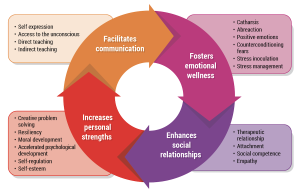
Thank you for visiting Utah Association for Play Therapy
The Utah Association for Play Therapy is an independent organization representing the Utah branch for the Association for Play Therapy (APT). The Utah Association for Play Therapy is organized as a Utah non-profit corporation.
The purpose of UAPT is to provide a forum for the discussion of play therapy ideas and concerns to fulfill the Association objectives.
The objectives of the UAPT are:
- To seek to advance the discipline of play therapy.
- To promote training, research and the development of materials which will further the practice of Play Therapy.
- To provide ongoing professional development of its members
to inform and educate the general public and the health care community about the role of play therapy in referral, assessment and treatment. - To promote sound play therapy practices in the interest of society and the individual, advance high standards of professional conduct and provide a forum to address complaints about the unethical conduct of members.
- To advocate for the rights of children, their families and significant others.
- To establish contacts with various organizations for collegial support and educational pursuits.
- To advance high standards of professional conduct by conducting educational and professional meetings and conferences.
What is Play Therapy?
Play therapy is a structured, theoretically based approach to therapy that builds on the normal communicative and learning processes of children. The curative powers inherent in play are used in many ways. Therapists strategically utilize play therapy to help children express what is troubling them when they do not have the verbal language to express their thoughts and feelings. In play therapy, toys are like the child’s words and play is the child’s language. Play therapy is a well established discipline based upon a number of psychological theories. Research, both qualitative and quantitative shows that it is highly effective in many cases. Recent research by PTUK, an organization affiliated to Play Therapy International, suggests that 71% of the children referred to play therapy will show a positive change.
Who Comes to Play Therapy?
Children are referred for play therapy to resolve their problems which can include behavioral problems such as acting out at school or in the home, emotional difficulties such as depression, anxiety, or OCD, or poor social skills. Children also are referred to come in to work through family issues such as divorce, death, loss and abandonment issues.
Why Play in Therapy?
Play is a fun, enjoyable activity that is the natural way in which children learn about and explore the world around them. It elevates our spirits and brightens our outlook on life. Play Therapy utilizes this natural ability of children and uses developmentally appropriate techniques to expand self-expression, self-knowledge, self-actualization and self-efficacy. Play relieves feelings of stress and boredom, connects us to people in a positive way, stimulates creative thinking and exploration, regulates our emotions, and boosts our ego. In addition, play allows us to practice skills and roles needed for survival. Researchers now have evidence that learning and development are best fostered through play.
Play Therapy Can:
- Help children learn more adaptive behaviors.
- Provides a corrective emotional experience necessary for healing
- Promote cognitive development
- Provide insight about and resolution of inner conflicts or dysfunctional thinking in the child
- Heal from trauma, loss, and/or grief experiences
How does play therapy work?
A safe, confidential and caring environment is created between the therapist and child, which allows the child to play with as few limits as possible but as many as necessary (for physical and emotional safety). This allows healing to occur on many levels. Play and creativity operate on impulses from outside our awareness – the unconscious. Play Therapy provides a safe psychological distance from their problems and allows expression of thoughts and feelings appropriate to the child’s development. The therapist may reflect back to the child observations of what has happened during the session if this is felt to be appropriate. Above all the child is given “Special Time” where they are the focus of attention and where they can begin to learn how to feel and express feelings in a healthy manner. The child is given strategies to cope with difficulties they face in life and which they themselves cannot change. It provides a more positive view of their future life.
Play therapy differs from regular play in that the therapist helps children to address and resolve their own problems. Play therapy builds on the natural way that children learn about themselves and their relationships in the world around them. Through play therapy, children learn to:
- communicate with others
- express feelings
- modify behavior
- develop problem-solving skills
- learn a variety of ways of relating to others.
The Therapeutic Powers of Play

Play Facilitates Communication.
-
Self Expression - Play provides children with the opportunity to express their feelings, thoughts, and to make sense of their experiences
-
Access to the unconscious - Play expresses the language of the right hemisphere of our brain, allowing children to rework their earlier emotional responses and associated memories through projection, displacement, and symbolization in a safe way
-
Direct teaching - In play, children are actively involved in the learning process through receiving instruction, observing their clinician model a skill, and participating in guided practice paired with encouragement
-
Indirect teaching - Play allows children to tell their stories through a metaphor, allowing themes to emerge that are directly related to how they originally processed an event
Play Fosters Emotional Wellness.
-
Catharsis - Play gives children an opportunity to purge their negative feelings (like anger or aggression) in order to obtain a calm psychological state
-
Abreaction - Play helps children recreate experiences in an attempt to assimilate unexpected and uncontrollable experiences that have confused, overwhelmed, and disempowered them
-
Positive emotions - Play creates a space that gives children permission to have fun, be joyful, smile, laugh, be silly, and feel happy
-
Counter conditioning fears - Play reduces a fearful or anxious response by helping children learn an incompatible positive response to be matched with it (systematic desensitization)
-
Stress inoculation - Play helps children learn and manage feelings related to future events that are likely to be stressful by providing toys and materials related to the stressor that allow a child to play out what might happen
-
Stress management - Play facilitates cognitive, physical, and emotional opportunities for children to decrease stress through self-soothing/relaxing play, fantasy/pretend play, social play, and exploratory play
Play Enhances Social Relationships.
-
Therapeutic relationship - Play allows children to experience a sense of security and trust in the therapy process and feel comfortable with an attuned clinician that embodies the characteristics of a healthy caregiver-child relationship/attachment
-
Attachment - Play helps reorder and organize a child’s internal experiences through attuned and responsive interactions with a clinician so that the automatic feelings and behaviors that arise will become more coherent and satisfying
-
Social competence - Play helps children improve communication skills, self-control of impulses, reciprocity & empathy, and recognition & control of emotions
-
Empathy - Play allows for repetitive, relational experiences that are met with authenticity, genuineness, and warmth from a clinician
Play Increases Personal Strengths.
-
Creative problem solving - Play allows children to generate ideas, stories, and emotions from scratch, which improves divergent thinking, flexibility in problem solving, gains in insight, and use of new coping skills
-
Resiliency - Play reduces risk factors and increases protective factors through providing a new perspective of oneself in a nonjudgmental environment where vulnerability can thrive
-
Moral development - Play gives children opportunities to place different values on rules and weigh these values relative to their developmental level
-
Accelerated psychological development - Play provides opportunities to practice and develop a multitude of skills cognitively, linguistically, socially, and emotionally
-
Self-regulation - Play helps children improve their executive functioning by practicing the mental processes that allow them to delay gratification through independent and assisted skills
-
Self-esteem - Play therapists enhance a child’s self-esteem through acceptance and caring, consistent positive feedback, cognitive restructuring, empowerment training, modeling, and opportunities for practice
In summary, numerous reviews of play therapy outcome research have shown that play therapy is effective. As numbered above, inherent in play behaviors are multiple active forces that produce behavioral change. Children are not one-size-fits-all and they require a clinician who is thoroughly trained in multiple play therapy theories and techniques in order to select and integrate several powers of play in a therapeutic session.


